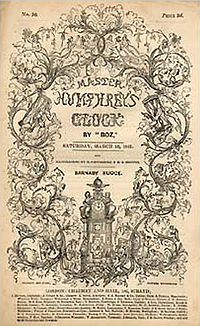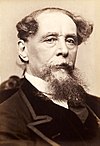Barnaby Rudge
 Cover, serial of Master Humphrey's Clock, 1840 | |
| Author | Charles Dickens ("Boz") |
|---|---|
| Original title | Barnaby Rudge: A Tale of the Riots of 'Eighty |
| Illustrator | George Cattermole Hablot Knight Browne (Phiz) |
| Country | England |
| Language | English |
| Series | 88 Weekly parts: Master Humphrey's Clock: February-November 1841[1] |
| Genre | Fiction Historical Social criticism |
| Publisher | Chapman & Hall |
Publication date | 1841 |
| Media type | Print (serial, hardback, and paperback) |
| Preceded by | The Old Curiosity Shop |
| Followed by | Martin Chuzzlewit |
Barnaby Rudge: A Tale of the Riots of Eighty (commonly known as Barnaby Rudge) is a historical novel by British novelist Charles Dickens. Barnaby Rudge was one of two novels (the other was The Old Curiosity Shop) that Dickens published in his short-lived (1840 - 1841) weekly serial Master Humphrey's Clock. Barnaby Rudge is set during the Gordon Riots of 1780.
Barnaby Rudge was the fifth of Dicken's novels to be published. It had originally been planned to appear as his first, but changes of publisher led to many delays, and it first appeared, in serial form in the Clock from February to November 1841.
It was Dickens' first attempt at a historical novel (his only other being the much later A Tale of Two Cities, both of which were set in revolutionary times)[2]. It is one of his less esteemed novels and has rarely been adapted for film or television (the last attempt was a 1960 BBC production; prior to that, a silent film was made in 1915).
Plot summary

Gathered round the fire at the Maypole Inn, in the village of Chigwell, on a foul weather evening in the year 1775 were John Willet, proprietor of the Maypole, and his three cronies. One of the three, Soloman Daisy, tells a stranger at the inn a well-known local tale of the murder of Reuben Haredale which had occurred 22 years ago that very day. Reuben had been owner of the Warren, an estate in the area, now the residence of the deceased Reuben's brother, Geoffrey, and his niece, Reuben's daughter Emma Haredale.
After the murder Reuben's gardener and steward were missing and suspect in the crime. The body of the steward was later found, identified only by clothes and jewelry. The gardener was never found and was assumed to be the murderer.
Joe Willet, son of the Maypole proprietor, quarrels with his father because John treats the twenty year old Joe as a child. Finally having had enough of this ill treatment, Joe leaves the Maypole and goes for a soldier, stopping to say goodbye to the woman he loves, Dolly Varden, daughter of locksmith Gabriel Varden.
Meanwhile, Edward Chester is in love with Emma Haredale. Both Edward's father, John Chester, and Emma's uncle, the catholic Geoffrey Haredale, sworn enemies, oppose the union. Edward quarrels with his father and leaves home for the West Indies.
Barnaby Rudge, a local idiot, wanders in and out of the story with his pet raven, Grip. Barnaby's mother, widow of the murdered steward at the Warren, begins to receive visits from a shadowy highwayman whom she feels compelled to protect. She later gives up the annuity she had been receiving from Geoffrey Haredale and, without explanation, takes Barnaby and leaves the City hoping to escape the unwanted visitor.
The story advances five years to a wintry evening early in the year 1780. On the 27th anniversary of the murder of Reuben Haredale, Soloman Daisy, winding the bell tower clock, sees a ghost in the churchyard. He reports this hair-raising event to his friends at the Maypole and John Willet decides that Geoffrey Haredale should hear the story. He departs amidst a winter storm taking Hugh, hostler of the Maypole, to guide him.
Barnaby and Mary Rudge On the way back to the Maypole, John and Hugh are met by three men seeking the way to London and, finding it thirteen miles off, seek refuge for the night, and beds are prepared for them at the Maypole.
These visitors prove to be Lord George Gordon, his secretary, Gashford, and a servant, John Grueby. Next day the three depart for London, inciting anti-Catholic sentiment along the way and recruiting Protestant volunteers from which Ned Dennis, hangman of Tyburn, and Simon Tappertit, former apprentice to Gabriel Varden, are chosen as leaders. Hugh, finding a handbill left at the Maypole, joins the Protestant throng Dickens describes as "sprinkled doubtless here and there with honest zealots, but composed for the most part of the very scum and refuse of London, whose growth was fostered by bad criminal laws, bad prison regulations, and the worst conceivable police."
Barnaby and his mother have been living quietly in a country village, their whereabouts unknown despite Geoffrey Haredale's attempts to find them. The mysterious stranger finds them and sends Stagg, the blind man, to attempt to get money from them. Barnaby and his mother then flee to London hoping to again lose their pursuer.
When Barnaby and his mother arrive at Westminster Bridge they see a crowd of rioters heading for a meeting on the Surrey side of the river. Barnaby is duped by the rioters into joining them, despite his mother's pleas. The rioters then march on Parliament, burn several Catholic churches and the homes of Catholic families.
A detachment led by Hugh and Dennis head for Chigwell, leaving Barnaby to guard The Boot, the tavern they use as their headquarters, intent on exacting revenge on Geoffrey Haredale. The mob loots the Maypole on their way to the Warren, Haredale's home, which they burn to the ground. Emma Haredale and Dolly Varden are taken captive by the rioters. Barnaby is taken prisoner by soldiers and held in Newgate, which the mob plans to burn.
The mysterious stranger haunting Mrs Rudge is captured by Haredale at the smoldering ruins of the Warren where he had gone to join the mob. He turns out to be Barnaby Rudge Sr, husband of Mrs Rudge, Barnaby's father and murderer of Reuben Haredale and his gardener. He was the steward of Reuben Haredale, assumed murdered by the gardener with whom he had switched clothes.
The rioters capture Gabriel Varden, with the help of his wife's maid Miggs, and attempt to have the locksmith help them break into Newgate to release prisoners. He refuses and is rescued by two men, one of them has only one arm. The rioters then burn Newgate where Barnaby and his father are being held. All of the prisoners escape but Barnaby, his father, and Hugh are captured by soldiers assisted by Dennis, the hangman, who has turned to the other side seeing a bounty of clients now needing his special talents. With the military patrolling the streets the rioters soon scatter, many are killed.
Joe Willet has returned from fighting in the American Revolution and has lost an arm. Joe, along with Edward Chester, turn out to be the rescuers of Gabriel Varden. The pair then rescue Dolly and Emma.
Dennis is arrested and sentenced to die with Hugh and Barnaby. Hugh and Dennis are hanged. Barnaby, through the efforts of Gabriel Varden, is pardoned.
Joe and Dolly are married and become proprietors of the rebuilt Maypole. Edward Chester and Emma are married and go to the West Indies. Miggs tries to get her position back at the Varden household, is rejected, and becomes a jailer at a women's prison. Simon Tappertit, his legs crushed in the riots, becomes a shoe-black. Gashford later commits suicide. Lord George Gordon is held in the Tower and is later judged innocent of inciting the riots. Sir John Chester, now a Member of Parliament, turns out to be the father of Hugh and is killed in a duel by Geoffrey Haredale. Haredale escapes to the continent. Barnaby and his mother live out their years tending a farm at the Maypole Inn.
Characters
- The Rudges – Barnaby, a simple man, his loving mother Mary, and his companion Grip the loquacious raven
- The Willets – Old John, the keeper of the Maypole Inn, and his kindly son Joe
- The Vardens – Gabriel, the locksmith, his overbearing wife Martha, and his beautiful daughter Dolly
- The Chesters – the villainous Sir John, Esquire, M.P. (Member of Parliament) and his innocent son Edward
- The Haredales – Mr Geoffrey Haredale, younger brother of the murdered Reuben, and his niece (Reuben's daughter) Emma
- Hugh – the sinister handyman of the Maypole Inn
- Lord George Gordon (a fictionalization of the historical personality), his loyal servant John Grueby, and his obsequious and conniving secretary Mr Gashford
- Simon Tappertit – Gabriel Varden's apprentice, and Miggs, Mrs Varden's shrewish lady's maid
- Ned Dennis – the hangman of Tyburn
- The mysterious stranger, ultimately revealed to be Barnaby Rudge Sr, the steward and murderer of Reuben Haredale
- Stagg – the crafty blind man
- Solomon Daisy, 'Long' Phil Parkes, and Tom Cobb, Old John's three cronies
- Mr Langdale – the purple-faced old vintner
Allusions/references from other works
Grip the raven inspired Edgar Allan Poe to write his most successful poem, "The Raven."[3] Poe had written a review of Barnaby Rudge for Graham's Magazine saying, among other things, that the raven should have served a more symbolic prophetic purpose. At the end of the fifth chapter, Grip makes a noise and someone says, "What was that – him tapping at the door?" The response is, "'Tis someone knocking softly at the shutter."[4]
See also
References
- ^ David Perdue's Charles Dickens Page; Barnaby Rudge
- ^ Online Literature website; Barnaby Rudge
- ^ Kopley, Richard and Kevin J. Hayes. "Two verse masterworks: 'The Raven' and 'Ulalume'," collected in The Cambridge Companion to Edgar Allan Poe, edited by Kevin J. Hayes. New York: Cambridge University Press, 2002. p. 192. ISBN 0521797276
- ^ "RE: Cremains/ Ravens". Pro Exlibris archives. Archived from the original on 2008-02-23.
External links
Online editions
- Barnaby Rudge at Internet Archive. Master Humphrey's Clock edition
- Barnaby Rudge at Internet Archive. Philadelphia edition
- Barnaby Rudge at Project Gutenberg
- Barnaby Rudge – Searchable HTML version
- Barnaby Rudge – Easy to read HTML version
- Barnaby Rudge audio book at Librivox.org
- Guardian.co.uk, an essay on Barnaby Rudge by Peter Ackroyd in The Guardian

